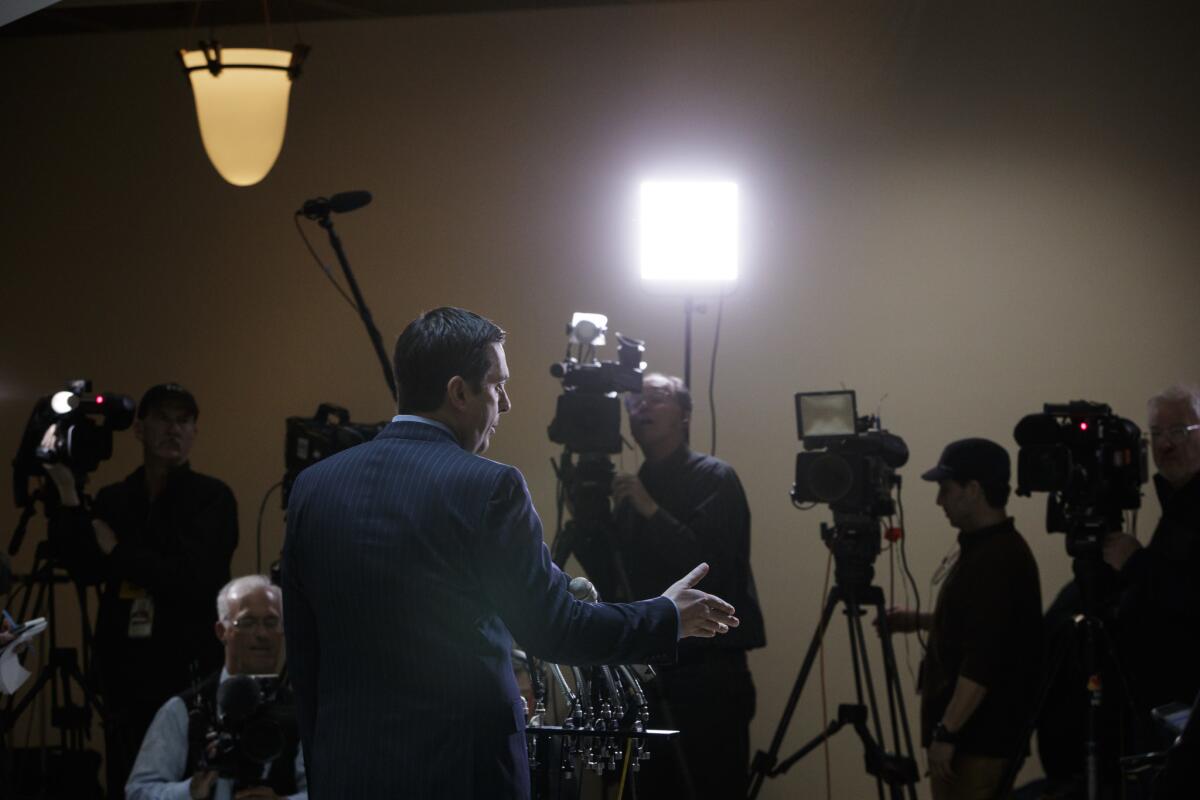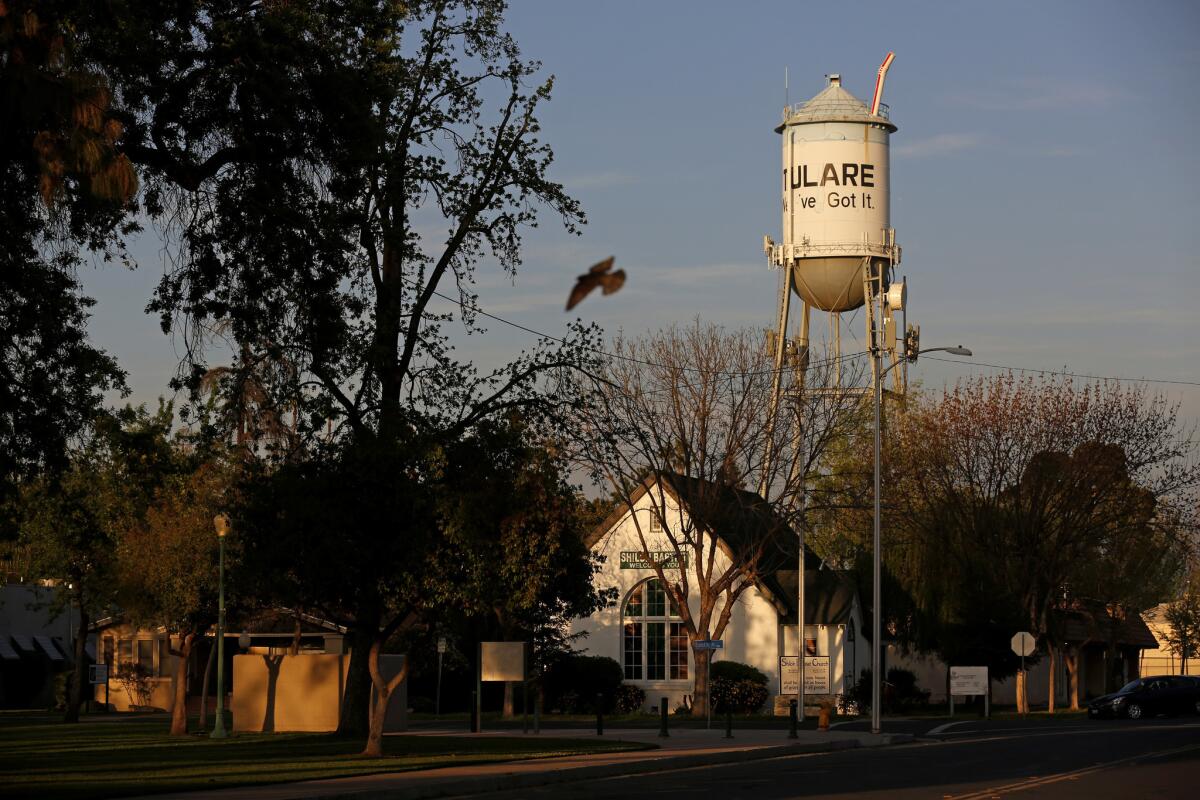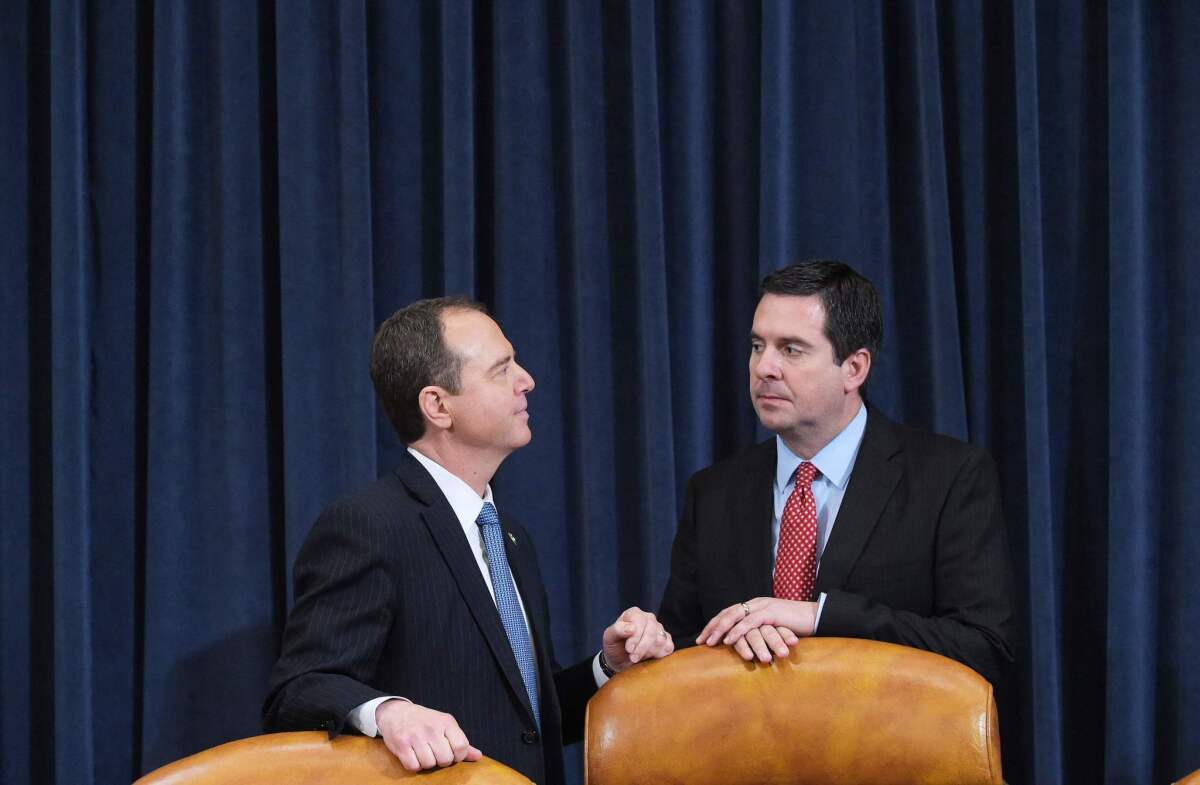Washington may be shaking its head, but Devin Nunes is still a hometown hero

At home, Devin Nunes remains what he has always been, an auspiciously successful man who rose swiftly to unexpected heights, a man high school teachers point to when they tell kids in this often-overlooked place what is possible in this world.
Outside the farming community southeast of Fresno that has sustained him and his family for generations, though, many see the 14-year Republican congressman very differently — as a national symbol of political bungling or worse.
The House investigation of Russian interference in the 2016 election, which he heads, has stalemated. A senator from his party has acidly compared him to Inspector Clouseau, the bumbling French detective from the “Pink Panther” movies. Democratic leaders have accused him of working with the White House to divert attention from the investigation into whether the Trump campaign colluded with Russia to derail Hillary Clinton’s candidacy. In much of official Washington, the mention of Nunes’ name prompts dismissive shakes of the head.
The two views of Nunes are impossible to reconcile, not that many in his district are trying to. In a region where troubles often take the form of drought or pestilence, his longtime constituents greet Nunes’ difficulties with a shrug, their faith in him undiminished.
Devin Nunes steps aside from Russia probe »
For many here, the 43-year-old congressman represents something bigger than himself: the ambitions of a band of immigrants who worked their way to success and the respect yearned for in a place long in the shadows of glitzy metropolises to the north and south.
But the two perspectives on Nunes merge on one point that may explain what has brought him so much trouble. As his lifelong friend and longtime political aide Johnny Amaral put it: “Devin is a fiercely loyal person. He’s the kind of guy you want next to you in a fight. He’s the kind of guy you want next to you in life.”
Some who have watched Nunes for years, though, suggest that the current public scrutiny has exposed a blind spot -- an excess of loyalty to Trump, on whose transition team he worked, and to the House GOP leadership that has advanced his career.
------------
FOR THE RECORD
4:50 p.m.: An earlier version of this report misspelled two-time Olympic gold medalist Bob Mathias’ last name as Matthias.
------------
Nunes himself brushes off such criticism. He is publicly serene about what lies ahead. He blames Democrats and the news media for politicizing the House investigation, and flatly denies that he’s crossed any line.
“There’s no question that this is all politics for the Democrats,” he said in an interview, “They’re just engaged in typical D.C. politics, which is, ‘If you don’t have a message, just destroy the messenger.’ I don’t view it any differently than that.”
Yet the public denunciations, even ridicule, he faces is new and different for a man who won a seat in Congress by the age of 29.

For years, Dave Caetano, who teaches agriculture at Tulare Union High School, has considered the congressman so inspirational that he points out Nunes’ former chair to students in need of motivation.
“He just got things done,” said Caetano, who taught Nunes for three years. “He didn’t jump on a table and scream and holler, nothing like that. It was more, you need something done—‘Devin, can you get this done?’—and it was done.”
Now, protesters pester him at events and show up outside the gates of the tract of tile-roofed middle-class homes called “Presidential Estates” where he and his family live. Democrats even dream of defeating him in 2018—a long shot given that Nunes has gotten more than two-thirds of the vote in seven of his eight congressional elections.
To some in Tulare, and to Nunes himself, the storm that surrounds him only reinforces the argument that President Trump made when he captured this region and similar ones around the country in November: Elites in places like Washington and San Francisco and Los Angeles are out to destroy conservatives and the people who support them.
That view has ensured Nunes a comfortable embrace here amid the maelstrom, as the two worlds he has long inhabited deliver vastly different judgments of him.
On the national stage, he has been obscure until very recently, a fact evident each time television pundits mangle his name. It is Portuguese— NEW-nes, not NOON-yes.
The Portuguese immigrants arrived here in two large movements, one at the early part of the 20th century and one in the 1950s, that saw families leave their homes in the Azores islands of the mid-Atlantic and migrate to California’s great agricultural valley. Relegated to peasant status at home, they worked the fields and dairies of their new country and scrambled for enough cash to buy one cow, then another, eventually accumulating a herd and land. Ultimately they would control huge portions of the state’s dairy operations.
“A lot of these farm families, one to two generations back were immigrants with nothing. And they built pretty expensive land holdings and wealth,” said Elmano Costa, a professor of education at Cal State Stanislaus and a Portuguese American. Only the foolhardy, he said, underestimate their ambition.
Nunes’ wife, Elizabeth, also is Portuguese American. They married in 2003 at St. Aloysius Church, where Mgsr. Richard Urizalqui estimated 70% of the congregation descended from Azorean immigrants. They have three young daughters.
Nunes’ ancestors came in the first wave and built a dairy that relatives still run on a side road north of Tulare, where homes and mini-malls give way to open fields — fields that this year, for the first time in what seems like ages, are joyfully muddy. Herds of brown cows loll near a small tan craftsman-style house, where the congressman’s grandfather was born, according to a relative.
As a young man, Nunes worked there and led a typical teen life, favoring the hairstyles of the ’90s, listening to AC/DC and Journey, adoring Larry Bird and the Boston Celtics, cheering for the Oakland Raiders. He joined the Future Farmers of America, worked on the student-run farm, and, Amaral remembered, nurtured an interest in conservative talk radio.
After graduation, Nunes attended College of the Sequoias, a community college in Visalia, then transfered to Cal Poly San Luis Obispo, where he earned two agricultural degrees. Earlier generations of young men would have joined the family business, but Nunes came of age as that tradition gave way to other options. For him: politics.

At 22, he ran for a seat on the College of the Sequoias board; set up as the “sacrificial lamb,” the congressman joked, he won. Two years later, in 1998, he ran for Congress and lost. In 2002, luck went his way: a newly created congressional seat opened and he won. He joined Congress just two years after another ambitious young Californian, Rep. Adam Schiff of Burbank, now the House Intelligence Committee’s ranking Democrat.
Nunes’ early House races provided a template for his Washington career: He built relationships with powerful mentors and benefited greatly from their backing. In both congressional races, he won a rare endorsement from local legend Bob Mathias, the two-time Olympic gold medalist in the decathlon and later a four-term congressman, who also attended Tulare Union.
Over time, Nunes crafted similar relationships with Bill Thomas, then the powerful Republican congressman from Bakersfield, and the last two speakers of the House, Ohio Rep. John Boehner and Wisconsin’s Paul Ryan.
He also was bolstered by expanding Portuguese American political power. By the time Nunes was growing up, the immigrants, by virtue of being landowners, had become a political force. Nunes is one of six Portuguese Americans to have represented the Central Valley in Congress in recent years, a remarkable record for a relatively small immigrant group.
He arrived in Washington as a George W. Bush Republican, affable but still outspoken. He lambasted environmentalists for costing the Central Valley its water supply; he said Gov. Arnold Schwarzenegger should resign for failing to aid farmers. In 2013, when some conservative Republicans sought to close down the federal government in a dispute over Obamacare, he termed the outliers “lemmings with suicide vests.”
He was acting in defense of party leaders, and it paid off. Boehner appointed him as head of the Intelligence committee in 2015. Ryan has defended Nunes in recent weeks.
Nunes also has tried to forge a relationship with Trump, whose support he would need to achieve his goal of getting more water for the region’s farms. He is fluent in Trump’s outsider language, asserting that those in the cities consider a rural resident “a lower-class citizen.”
Nunes’ position as head of the Russia investigation has been complicated from the start, since he served as a member of Trump’s transition team, advising on intelligence.
For a time, he sought to display public unity with Schiff. He also joined other GOP leaders in casting aspersions on former President Obama and his allies, focusing attention on Trump’s allegations of misconduct rather than the questions about the president and his team that the FBI and U.S. intelligence agencies have been examining.
Even after FBI Director James B. Comey confirmed he was investigating whether Trump associates colluded with Russians to affect the election, Nunes has remained stubbornly focused on finding who had leaked information damaging to the new administration.
Yet his recent actions have divided Republicans while outraging Democrats.
The most damaging — to his committee and perhaps to his reputation — started with Nunes’ abrupt early evening visit to the White House complex nearly two weeks ago to view classified intelligence reports.
The next day, he dramatically announced to reporters that he had seen evidence that some of Trump’s transition advisors, and perhaps Trump himself, had been swept up in U.S. intelligence surveillance. He raced to the White House to brief Trump on what he called the “alarming” turn, and afterward held another news conference outside the West Wing.
The furious activity seemed intended to back up Trump’s assertion that he’d been the victim of surveillance by Obama — a claim that has been roundly dismissed by law enforcement agencies and most Republican leaders — and to suggest that Trump had been in the dark about it until alerted by Nunes.
That, it turned out, was false. Not only was the administration aware, it was administration officials, including a lawyer on the National Security Council staff who recently had worked for Nunes’ committee, who had shown him the documents, according to news reports confirmed by U.S. officials.
It is in his explanations of those events that the local and Washington views of Nunes divide most jarringly. In Tulare, supporters describe him as a man who bluntly and plainly says what he means. In the Capitol, he has hurt his standing with confusing and often contradictory language. His actions have created a sharp contrast with Schiff, who has proven a more effective messenger for his party.
Regarding the secret intelligence, he first told reporters that the classified documents showed that Trump associates, and perhaps even the president-elect himself, had been picked up by intelligence surveillance during the transition. Pressed on that point, he later said that was merely possible. He said the documents showed that the names of transition aides had been disclosed — “unmasked,” in the jargon of surveillance — then acknowledged that most of the names remained secret but said that he could discern the identities.
In an interview with The Times, he bridled at insinuations that, under pressure from the White House, he’d canceled a committee hearing that was to feature former Acting Atty. Gen. Sally Yates, who was fired by Trump early in his administration.
“There’s a story ... that the Trump administration asked me not to invite Sally Yates and not have a hearing, which is 100% accurate, I mean inaccurate,” he said.
Later, describing the evidence that he said had “alarmed” him enough to alert the president, he said that “it was involving Russia—I mean it was not involving Russia.”
He also suggested that the information had come from “people that I know within the intelligence agencies” that he had “cultivated over a long period of time” — a statement that seemed misleading when the actual sources became known.
Still, his future will be mostly determined by the sentiments at home, and judging by past elections, his seat would appear safe.
Jack Pitney, a professor of politics at Claremont McKenna College who worked for the Republican National Committee, was withering in his criticism of Nunes. Nevertheless, he said, Democrats face extremely long odds on unseating him.
“Before all this started, he didn’t get a great deal of attention, and if people thought of him at all it was as a mainstream, conservative Republican,” Pitney said. “Now he’s in the limelight and things change. Some people flourish and some people flounder. He’s floundering.”
But Nunes also is boxed in by his district’s strong support of Trump, Pitney pointed out, making the president a difficult ally to cross even if the congressman wanted to.
Among Nunes’ supporters in Tulare, there are few visible dents in his popularity. Michelle Nunley, the Tulare Union principal, said she had heard nothing negative around town.
“Everyone I know is extremely proud of the work he’s doing in Washington,” Nunley said.
Caetano, his former high school teacher, stipulated that the work of the Intelligence Committee is “way beyond my comprehension,” but said he has confidence in Nunes.
“This may be just one of those firestorms that you have to weather,” he said.
Nunes himself is plowing ahead. In the midst of a long defense of his actions, his honesty, and his fairness, he hit upon what sustained him.
“At the end of the day,” he said, “I’m held accountable by my voters…I’m very happy in this role that I do. I really don’t look that far over the horizon.”
Lead photo: Devin Nunes (R-Tulare) gives reporters an update about the ongoing Russia investigation. (J. Scott Applewhite / Associated Press)
Twitter: @cathleendecker
ALSO
Rep. Adam Schiff, Trump's public prosecutor, says he must be a 'guardian against the worst abuses'
How Trump supporters survive in blue California: 'You kind of keep your head down'
Trump administration stops disclosing troop deployments in Iraq and Syria
Updates on California politics
Get the L.A. Times Politics newsletter
Deeply reported insights into legislation, politics and policy from Sacramento, Washington and beyond. In your inbox three times per week.
You may occasionally receive promotional content from the Los Angeles Times.








